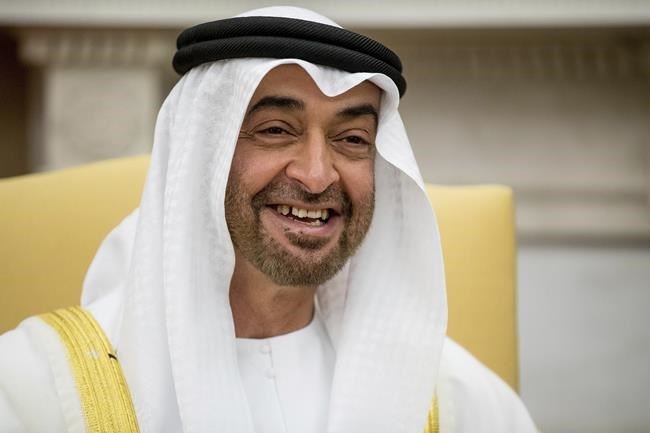
FILE - Abu Dhabi's crown prince, Sheikh Mohammed bin Zayed Al Nahyan, smiles during a meeting with President Donald Trump at the White House in Washington, May 15, 2017. (AP Photo/Andrew Harnik, File)
September 03, 2024 - 1:38 AM
DUBAI, United Arab Emirates (AP) — The leader of the United Arab Emirates on Tuesday pardoned 57 Bangladeshi nationals convicted in rapid trials over their involvement in protests in the Arabian Peninsula nation about unrest in their home country.
The decision by Sheikh Mohammed bin Zayed Al Nahyan, the ruler of Abu Dhabi, came after he held a telephone call last week with Bangladesh's interim prime minister, Nobel laureate Muhammad Yunus. Yunus took over Bangladesh after demonstrators drove longtime Prime Minister Sheikh Hasina to flee the country.
The arrests in the UAE underlined the strict laws criminalizing speech and public protest in this Gulf Arab country that is home to the cities of Abu Dhabi and Dubai.
The Emirates' state-run WAM news agency gave no figure for the number of Bangladeshis pardoned, but said it involved those who took part in “protests and disturbances across several emirates” in July.
“The decision includes cancelling the sentences of those convicted and arranging for their deportation,” WAM said.
In Bangladesh, the state-run Bangladesh Sangbad Sangstha news agency quoted an adviser to Yunus as saying that all 57 Bangladeshis arrested and tried would be coming back to the country soon.
The Abu Dhabi Federal Court of Appeal in July gave 10-year prison sentences to 53 Bangladeshi nationals and an 11-year term to another Bangladeshi national. Three others received sentences of life in prison in the Emirates, an autocratically ruled federation of seven sheikhdoms.
Prosecutors accused the men of “gathering in a public place and protesting against their home government with the intent to incite unrest,” obstructing law enforcement, causing harm to others and damaging property.
Human Rights Watch instead described the men as being “arbitrarily detained, convicted and sentenced to long prison terms ... based on their participation in peaceful demonstrations.”
The protests in the UAE followed weeks of demonstrations in Bangladesh by people upset about a quota system that reserved up to 30% of government jobs for relatives of veterans who fought in Bangladesh’s war of independence in 1971. The country’s top court in late July scaled back the controversial system.
Hasina, who had governed the country for 15 years, then resigned and fled Bangladesh on Aug. 5 as the protests intensified.
The weeks of violent protests and Hasina’s crackdown killed more than 600 people, according to United Nations' estimates.
In the UAE, broad laws tightly restrict speech and nearly all major local media are either state-owned or state-affiliated outlets. Laws also criminalize the very few protests that take place by foreign laborers.
The Emirates’ overall population of more than 9.2 million people is only 10% Emirati. The rest are expatriates, many of them low-paid laborers seeking to send money back home to their families. Estimates suggest Bangladeshis are the UAE's third-largest expatriate community, trailing only Indians and Pakistanis.
News from © The Associated Press, 2024